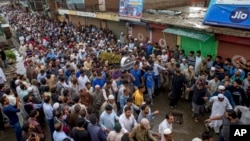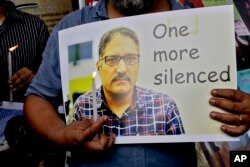In Indian Kashmir, thousands turned out to pay tribute at the funeral of a prominent journalist who was gunned down in the capital Srinagar, by unknown assailants. The killing of Shujaat Bukhari sent shock waves through the violence-scarred region where he was regarded as a strong voice for dialogue, reconciliation and peace.
Police said the assailants came on a motorbike late Thursday and fired bullets at the 50-year-old Bukhari as he was leaving his office, and also killed two policemen providing his security.
His death took place as the government pushed for peace in the region where violence has spiraled in the last two years, suspending anti-militant operations during the Muslim month of Ramadan. Bukhari, who was a vocal advocate of finding a political solution to the Kashmir dispute, had welcomed the step, calling it a "glimmer of hope for the common people."
Along with a photo of Bukhari on its front page, The Rising Kashmir daily, of which he was editor-in-chief, carried a message that it would not be cowed in the face of such violence. "We will uphold your principle of telling the truth howsoever unpleasant it may be."
Widespread condemnation
There was widespread condemnation of his killing by top Indian leaders and by journalists. Chief Minister of Jammu and Kashmir, Mehbooba Mufti said "terrorism has hit a new low with Shujaat's killing."
Calling it an act of cowardice, India's Home Minister, Rajnath Singh tweeted that "It is an attempt to silence the saner voices of Kashmir."
Bukhari had often called for dialogue with Kashmiris, including separatist leaders, and he expressed worries about a new trend that has seen local Kashmiri youth joining the ranks of militant groups.
He had been on the forefront of organizing conferences that explored ways to resolve South Asia's most intractable conflict that has seen the region which is claimed by both India and Pakistan pulled into a spiral of violence. He was also involved in a private peace-building initiative between the two countries.
In an interview to VOA last year, Bukhari said, "I am very clear, nobody supports violence. I would not be someone who would argue that you have to have violence to achieve a political goal because violence in any case only brings destruction."
Although Kashmir is regarded as an unsafe place for journalists, this is the first time in more than a decade that a journalist has been murdered in the region.
In a statement, the Editors Guild of India said Bukhari's killing "is a new low in a rapidly deteriorating environment for media practitioners in Kashmir in particular and in the country in general."





